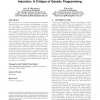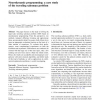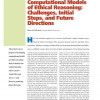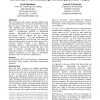160 search results - page 10 / 32 » A Computability Perspective on Self-Modifying Programs |
150
click to vote
GECCO
2009
Springer
15 years 9 months ago
2009
Springer
We revisit the roots of Genetic Programming (i.e. Natural Evolution), and conclude that the mechanisms of the process of evolution (i.e. selection, inheritance and variation) are ...
162
click to vote
NCA
2008
IEEE
15 years 2 months ago
2008
IEEE
The paper focuses on the study of solving the large-scale traveling salesman problem (TSP) based on neurodynamic programming. From this perspective, two methods, temporal differenc...
122
click to vote
EXPERT
2006
15 years 2 months ago
2006
on abstract principles that you can't easily apply in a formal, deductive fashion. So, the favorite tools of logicians and mathematicians, such as firstorder logic, aren'...
112
click to vote
BIRTHDAY
2010
Springer
15 years 3 months ago
2010
Springer
Stable models of logic programs have been studied by many researchers, mainly because of their role in the foundations of answer set programming. This is a review of some of the de...
118
click to vote
CHI
2003
ACM
16 years 2 months ago
2003
ACM
How is interacting with computer programs different from interacting with people? One answer in the literature is that these two types of interactions are similar. The present stu...




